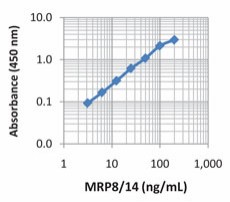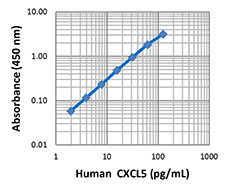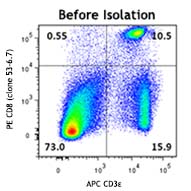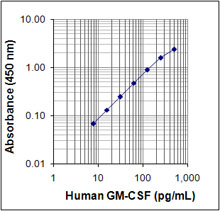- Regulatory Status
- RUO
- Other Names
- MRP8/MRP14 heterodimer, Myeloid-related protein 8/14, S100A8/A9, Calprotectin
- Ave. Rating
- Submit a Review
- Product Citations
- publications

| Cat # | Size | Price | Quantity Check Availability | Save | ||
|---|---|---|---|---|---|---|
| 439707 | 1 Pre-coated Plate | $485 | ||||
Migration inhibitory factor-related proteins MRP8 (S100A8) and MRP14 (S100A9) are members of the S100 family of calcium binding proteins. They are highly expressed in resting neutrophils, keratinocytes, infiltrating tissue macrophages, and on epithelial cells in active inflammatory disease. Human MRP8 has a molecular weight of 11.0 kD, while human MRP14 exists in a 13.3 kD and a truncated 12.9 kD form. Calcium induces the formation of MRP8/14 heterocomplexes (calprotectin). MRP8/14 complexes are produced in large quantity by activated granulocytes and monocytes.
MRP8, MRP14, and their heterodimer MRP8/14 have been shown to have major roles in inflammatory and immunological responses. MRP8 and MRP14 regulate myeloid cell function by binding to Toll-like receptor-4 and the receptor for advanced glycation end-products (AGE). One major function of the MRP8/14 heterocomplex is its antimicrobial activity (hence the name calprotectin) by inhibiting the growth of pathogens through competition for zinc. MRP8/14 also regulates vascular inflammation and contributes to the biological response to vascular injury by promoting leukocyte recruitment, macrophage cytokine production, and SMC proliferation. In addition, MRP8/14 heterocomplex has a unique role as a fatty acid transport protein. This makes MRP8/14 an important mediator between calcium signaling and arachidonic acid effects.
MRP8/14 proteins are regarded as markers for a number of inflammatory diseases in humans. Various conditions have shown significant correlation of MRP8/14 levels with disease activity. For example, MRP8/14 levels in stool are a reliable indicator of intestinal inflammatory conditions and can be used to predict relapse in inflammatory bowel diseases. Plasma MRP8/14 level can be a marker for acute rejection in kidney allograft transplantation. Concentrations of MRP8/14 in serum, and particularly in synovial fluid, correlate strongly with disease activity in rheumatoid arthritis. In Systemic Lupus Erythematosus (SLE) patients, serum levels of MRP8/14 are higher than in healthy controls and are associated with disease activity. MRP8/14 may also be a useful biomarker of platelet and inflammatory disease activity in atherothrombosis. Increasing plasma concentrations of MRP-8/14 among healthy individuals can predict the risk of future cardiovascular events.
BioLegend’s LEGEND MAX™ Human MRP8/14 (Calprotectin) ELISA Kit is a Sandwich Enzyme-Linked Immunosorbent Assay (ELISA) with a 96-well strip plate that is pre-coated with a capture antibody. This kit is specifically designed for the accurate protein quantitation of human MRP8/14 from cell culture supernatant, serum, plasma, and other biological fluids. It is analytically validated with ready-to-use reagents.
Kit Contents
- Kit Contents
-
- Anti-Human MRP8/14 Pre-coated 96-well Strip Microplate
- Human MRP8/14 Detection Antibody
- Human MRP8/14 Standard
- Avidin-HRP B
- Assay Buffer A
- Wash Buffer (20X)
- Substrate Solution D
- Stop Solution
- Plate Sealers
Product Details
- Verified Reactivity
- Human
- Application
-
ELISA
-
Application References
(PubMed link indicates BioLegend citation) -
- Carrion M, et al. 2013. Rheumatology. 52:2177. PubMed
- Product Citations
-
- Sensitivity
- 0.62 ± 0.34 ng/mL
- Standard Range
- 3.13-200 ng/mL
- Materials Not Included
-
- Microplate reader able to measure absorbance at 450 nm
- Adjustable pipettes to measure volumes ranging from 1 µL to 1,000 µL
- Deionized water
- Wash bottle or automated microplate washer
- Log-Log graph paper or software for data analysis
- Tubes to prepare standard dilutions
- Timer
- Plate Shaker
- Polypropylene vials
Antigen Details
- Cell Sources
- Leukocyte recruitment, macrophage cytokine production, and SMC proliferation
- Biology Area
- Cell Biology, Neuroscience, Stem Cells, Synaptic Biology
- Molecular Family
- Cytokines/Chemokines, Growth Factors
- Gene ID
- 6279 View all products for this Gene ID 6280 View all products for this Gene ID
- UniProt
- View information about MRP8/14 on UniProt.org
Related Pages & Pathways
Pages
Related FAQs
- In your LEGEND MAX™ ELISA Kits, there is a step that calls for washing the plates before adding sample. What is the purpose of this step?
-
We typically use a stabilizer for pre-coated plates. The additional washing step is designed to remove these components before you start the assay. If you do not perform the washing, the effect on assay performance is negligible.
- I have multiple LEGEND MAX™ ELISA kits that I want to run simultaneously. Can I use the same wash buffer for all the kits?
-
The wash buffer provided in all our LEGEND MAX™ kits is the same and the part numbers on the wash buffer bottles in these kits should be identical. For ELISA MAX™ Deluxe and ELISA MAX™ Standard Sets, we provide a recipe for the wash buffer on each kit’s technical data sheet. This recipe is the same for all ELISA MAX™ sets.
- For some of your ELISA kits, why do my serum samples require dilution with assay buffer?
-
In some cases, dilution with assay buffer is required to minimize the matrix difference between the samples and the standards to achieve better accuracy.
 Login/Register
Login/Register 













Follow Us